‘Raw truth’ of Hunger Strike
Sunday Times Online
Comment: Liam Clarke: Raw truth of hunger strike fights its way past myths
March 20, 2005
Anybody who wants to understand the history of the Provisional IRA and Sinn Fein should read Blanketmen, Richard O’Rawe’s searingly honest account of the events surrounding the 1981 hunger strike.
O’Rawe gives us something new in modern republican history: a participant’s account that attempts to face the facts without romanticising them.
Up to now we have had mostly anodyne accounts, in which every dead IRA man was good at Gaelic games, fearless on active service and loved his mother. Every decision taken by Gerry Adams, the infallible helmsman of the movement and founder of the peace process, was not only correct but also designed to save lives and bring about a ceasefire.
We have also been treated to cod biographies in which Adams never joined the IRA, and a book of lives of IRA volunteers in which well-known informers are revered for their dedication. In this alternative universe, the IRA never committed a crime and even when it made mistakes it was forced into them by the Brits. As Goethe noted, “patriotism ruins history”.
O’Rawe was a public relations officer for IRA prisoners and later for Sinn Fein, so it should not surprise him that the full weight of the republican propaganda machine was deployed to drown the simple truth that many of the later hunger strikers wanted to end the protest around the time when Joe McDonnell, the fifth of the 10 prisoners to die, reached the critical stage.
I know the feeling. I still remember the call from Danny Morrison to my home in North Belfast nearly 10 years ago. He was appealing to me not to write a book about the hunger strikes. He implored me not to slander the memory of the dead or bring distress to their families.
I had just conducted an interview with Geraldine Scheiss, the girlfriend of Kieran Doherty, the eighth hunger striker to die. She told me that he wanted to call off the strike and that, in his final two hours of life, asked her to get tablets to save him from death. Tom Toner, the prison chaplain, confirmed that shortly before Doherty died Scheiss had come out of his room to say he was asking for tablets “for his body”. Doherty’s mother wouldn’t agree until her husband Alfie got back to the jail. Scheiss tried unsuccessfully to get the tablets herself. By the time Doherty’s father returned to the prison, his son had died.
It was clear to me that Kieran Doherty was unhappy about the hunger strike and had expressed his doubts about continuing. He had told Mary McDermott, the mother of Sean McDermott, a close IRA comrade, that “there was a lot more to it than the five demands”. It was clear from her and from other prisoners that Paddy Quinn, another hunger striker who was taken off by his mother when he became unconscious, had spoken in favour of ending the strike.
I sent a copy of my taped interview with Scheiss to her for comment, mentioning in a covering letter that one or two passages were not clear. I got a solicitor’s letter back denying she had said any of it and saying the tape must all have been faulty. As a result I put in only what was independently confirmed.
Sinn Fein had stymied me at every turn in writing the book. I was invited for interviews and kept sitting for hours in a room with prisoners’ wives and relatives waiting for the Long Kesh minibus, only to be told that nobody was available to speak to me. Eventually two liaison people were appointed — Morrison later told me that the only purpose was to see what I was up to — but they proved quite helpful.
One was the former hunger striker Pat “Beag” McGeown, a republican of tremendous dedication, haunted by survivor’s guilt because his wife had taken him off the hunger strike when so many others had died. “You can’t really be sorry to be alive, but yes it does trouble me,” he said.
He hinted at things that would be confirmed and fleshed out in O’Rawe’s account. McGeown told me he had wanted the strike to end and that “a certain number of hunger strikers had arrived at the same conclusion and were saying, ‘Look, possibly the whole thing should be reviewed’.”
It was also clear to me that, although the IRA leadership had not wanted the hunger strike to start in the first place, once Bobby Sands was elected to Westminster things had changed. They wanted it to continue until Owen Carron, a Sinn Fein member who stood as “proxy prisoner” could be elected to the seat left vacant by Sands’s death. At the time there was a republican policy of not contesting Westminster or Dail elections and this was the leadership’s way round it. As Adams said in a 1985 Bobby Sands memorial lecture: “The hunger strikes, at great cost to our H-Block martyrs and their families, smashed criminalisation and led to the electoral strategy, plus the revamping of the IRA.”
O’Rawe puts it more bluntly. The hunger strikers, he said, may have been “cannon fodder” and six of them may have died just to get Sinn Fein’s political project under way.
The hunger strike was prolonged despite an offer to the Irish Commission for Justice and Peace (ICJP), which would have been guaranteed by the Catholic church’s hierarchy, that met many of the prisoners’ demands. Substantially the same offer was repeated through an MI6 officer with whom Adams was liaising, and was accepted by the prison leadership as the best deal available. When the hunger strike did eventually end, the same offer was at length implemented and greeted as a victory by republicans.
O’Rawe reveals that McGeown had been warned to keep quiet about his doubts when Adams visited the hunger strikers after many of their families asked him to end the strike. Adams made it clear the visit was a formality, saying that he had come because he “felt duty-bound to satisfy the clergymen and all those who were pressurising their families”.
Most tellingly of all he was accompanied by Carron, who was dressed in what the prisoners referred to as his “election suit”. The implied message was that they would be letting the movement down if they did not hold out until polling was over. Doherty did not attend because he was judged too ill. Instead Adams visited him in a private room and came out saying that “Big Doc” was determined to continue.
The price was deaths in the prison and on the streets, as hunger strike rioting continued. An honest debate on Sinn Fein’s entry to politics was avoided, and Adams’ strategy was advanced.
Some may say it was worth it. Ending the hunger strike after three or four deaths on the basis of the offer to the ICJP, and the parallel offer through MI6, would have set the Sinn Fein political project back. The Catholic church and the SDLP, who were to the fore in the ICJP, would have shared the credit, with little going the way of Sinn Fein.
Adams would then have had to argue openly for a political strategy. He might have faced a split.
Of course it is the duty of military leaders to take such decisions. Generals send men to their deaths after weighing the lives of soldiers against their overall strategic objectives.
It can be argued that Adams and the republican leadership made the right choice but it is an argument that they never had the courage to make. Certainly not to the families of the hunger strikers.
Sourced from Bobby Sands Net Resources
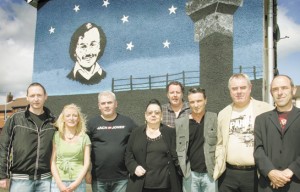
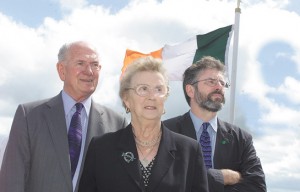
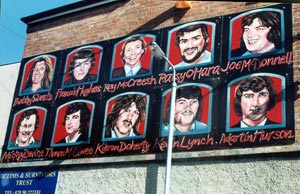

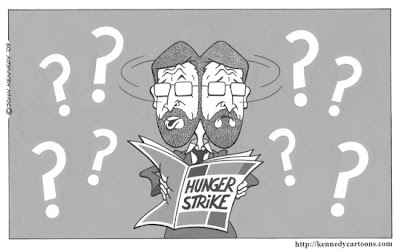
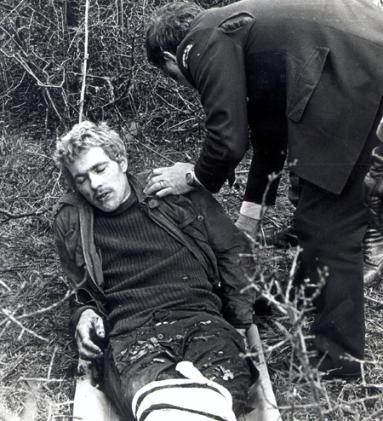
 It has withstood the blows of a million years, and will do so to the end.
It has withstood the blows of a million years, and will do so to the end.